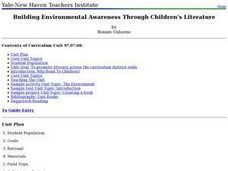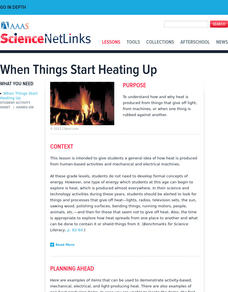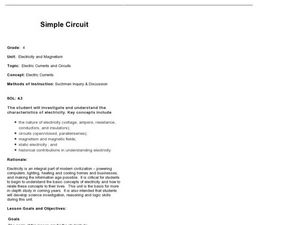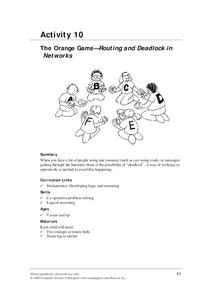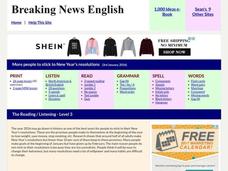Curated OER
Sexual Health Care
Why is it so important to get examinations of the breasts and genitalia? It could be a matter of a life or death situation. Better to be a little embarrassed, or a little uncomfortable, than the alternative of having an undetected...
Monterey Bay Aquarium
What's in a Name?
Combine art and word analysis in a lesson about genus and species. Elementary children sleuth out the meaning of scientific names for a number of shark species using a prefix and suffix definition chart. They then draw an image of the...
Curated OER
Environmental Awareness and Children's Literature
Use an alternative setting for pregnant teens and young mothers, as well as special education children to examine environmental topics through literature. Included in this unit is a visit to neighborhood libraries to select children's...
Curated OER
Are Dams Forever?
Students consider the life span of dams, and what would happen if a dam falls apart. In this environmental impact lesson, students discuss what the purposes of dams are, how they could be damaged.
Curated OER
What Can I Do?
Here is a good way for children to identify ways to handle conflict. They discuss the connection between feelings and conflict. Everyone listens to a story about a conflict between two friends and they discuss what they could have done...
Curated OER
Water 1: Water and Ice
Students experiment with states of matter with water and ice. For this states of matter lesson, students experiment to discover what happens to water as it freezes to become a solid, ice. They observe what happens when ice melts back to...
Curated OER
Thoreau, Emerson, and Transcendentalism
Tackle Transcendentalist literature with these questions. This resource provides 14 essay questions that cover different works by Thoreau and Emerson. Class members may also access an online quiz on the selection using the link at the...
Curated OER
Archeology Lesson; Making Inferences
Students discover what an archeologist is and make inferences about societies and cultures based on artifacts. In this archeology lesson, students complete an array of captivating activities, guessing about what an artifact is...
Curated OER
Chinese Philosophies & Ethical Codes
Focusing primarily on Confucianism, these slides contrast the philosophies of India with those of China - and introduce the philosophies of Legalism and Daoism as well. Your world history lecture will come alive with the clear outlines...
Curated OER
Simple Circuit: Electric Currents and Circuits
Through inquiry and exploration, 4th graders will learn and understand the functions of open and closed circuits. They will break into 2 groups, define vocabulary, hypothesize how to light a bulb, then test their hypothesis 4 different...
Curated OER
Civics Test for Citizenship: History and Government (51-100)
Use this presentation to help English learners prepare for their upcoming citizenship test. It includes questions 51-100 from the History and Government section of the exam (questions 1-50 can be found in a different presentation, linked...
Council for Economic Education
A Penny Saved
A penny saved is a penny earned! Scholars research the different ways to save money over a lifetime. They investigate the Rule of 72, compound interest, and sub-prime loans to gain an understanding of how banks aid in the saving process....
Curated OER
Is Modern Culture Ruining Childhood?
There are a lot of different ways a learner could respond to this New York Times article discussing the effects of modern culture on childhood. After reading the article, pupils construct a thoughtful blog post. The guiding questions...
PBS
What We Do Adds Up
With so many tons of trash going into landfills each year, your environmentalists can calculate how much the average person is tossing away. This activity has a series of questions not only requiring math, but a conscious thought of how...
National Museum of Nuclear Science & History
Alphas, Betas and Gammas Oh, My!
Referring to the periodic table of elements, nuclear physics learners determine the resulting elements of alpha and beta decay. Answers are given in atomic notation, showing the atomic symbol, mass, atomic number, and emission particles....
Virginia Polytechnic Institute and State University
Lesson Plan: Omelet Cooking Principles
Although designed for a foods lab, the information in this resource might be just the thing for your own recipe notebook. Illustrated, step-by-step directions for making the perfect omelet, egg-citing puzzles, games, and even...
Annenberg Foundation
Student Voices
Whether it's an election year or not, a unit on voting patterns and political campaigns will awaken the civic pride in your high school citizens. Divided into six parts, the curriculum covers various facets of an election, including...
Computer Science Unplugged
Battleships—Searching Algorithms
How does a computer perform a search in order to find data? The lesson begins with a demonstration on finding one number out of 15. Pairs then play three games of Battleship by using different search techniques. The lesson...
Virginia Department of Education
Modeling the Big Bang Theory
Young astronomers learn about the Big Bang Theory and redshift through a hands-on activity in the last installment of a three-part series. Participants draw dots on balloons and then inflate them to model how galaxies moved farther apart...
Computer Science Unplugged
The Orange Game–Routing and Deadlock in Networks
How is data able to move in a congested network? Groups simulate moving data around a congested network by passing fruit around a circle, following specific rules, until everyone ends up with their own fruit. Extension activities...
Computer Science Unplugged
Tablets of Stone—Network Communication Protocols
Show your learners that the game of Telephone isn't the only way messages get mixed up. Pairs transform into the sender and receiver of a message sent in packets. At least one pupil is the messenger who either delivers, delays, or...
Computer Science Unplugged
Treasure Hunt—Finite-State Automata
Introduce your class to the concept of finite-state automata with an activity that asks individuals to try to map their way to Treasure Island by taking different routes though an island chain. Each island has two ship sailing...
Code.org
Good and Bad Data Visualizations
Good versus bad data. Pairs rate online collections of data representations from good to bad and then suggest ways to improve the visualizations. The class then creates a list of best practices and common errors in data representations...
Breaking News English
More People to Stick to New Year's Resolutions
What makes a good New Year's resolution? Practice goal-setting and reading comprehension with a set of language arts activities. English learners work on cloze passages, synonym matches, interviewing exercises, and...
Other popular searches
- The Age of Reason
- Franklin?s Age of Reason
- Franklinâ¿s Age of Reason
- Age of Reason Philosophers
- Franklin¿s Age of Reason


